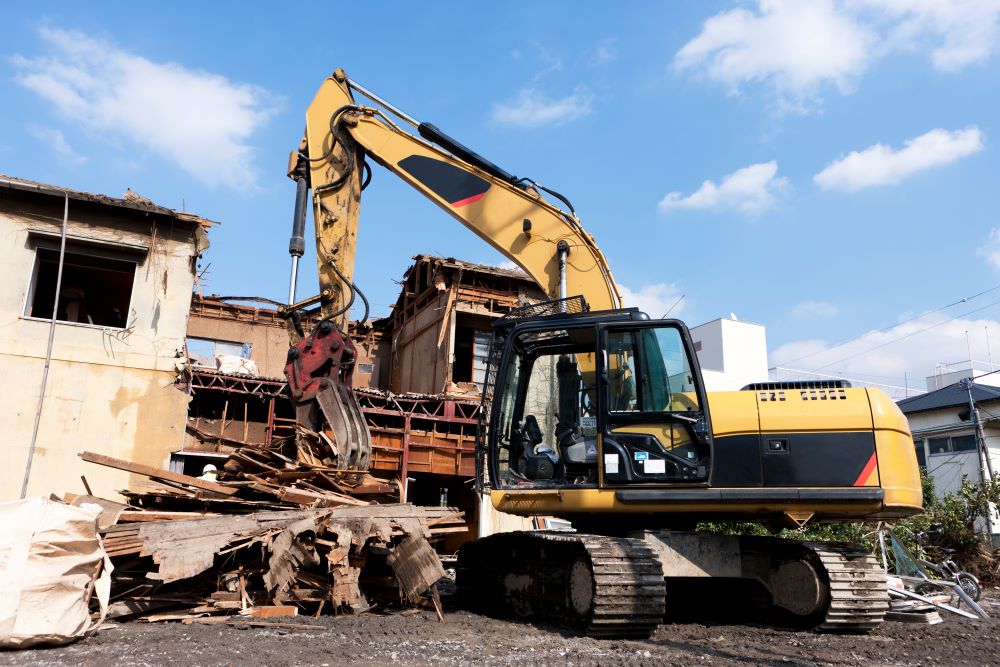
Residential Demolition and Its Impact on Property Value
Although the phrase “democracy” may evoke visions of anarchy and devastation, home demolition has effects that extend beyond the simple removal of a building. In actuality, the value of a property may be significantly impacted by residential demolition. This post will examine the several facets of residential demolition and how it may impact a property’s value.
The deliberate destruction of a residential building is referred to as residential demolition. This may apply to any kind of residential construction, including homes and flats. Demolition may be necessary to clear the site for future development, eliminate dangerous buildings, or create room for new construction. Heavy equipment and skilled demolition workers are usually used in the procedure to safely and effectively bring down the building.
OUR SERVICES
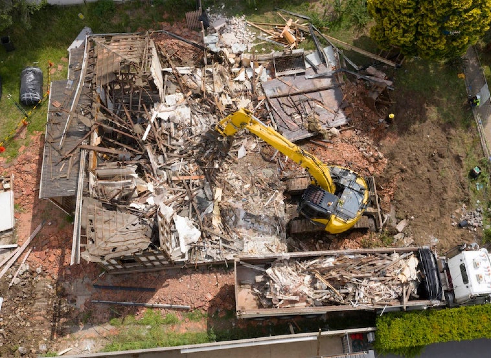
Structure Demolition. Residential, Commercial & Industrial
If your structure poses a health, safety, or environmental risk, demolition can prevent costly citations or fatal accidents. While this may seem daunting, you are just a phone call away from having your residential demolition done professionally, responsibly, and at a great price.
Talk to a Demolition Specialist Now! 916.249.5001
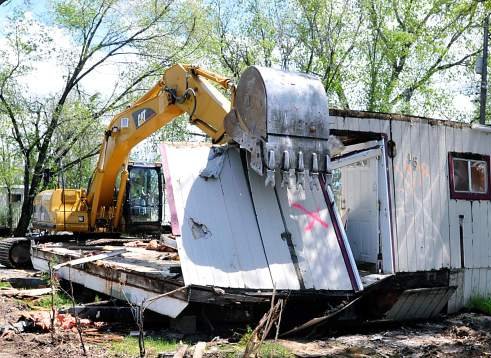
Mobile Home Demolition
We demolish and haul away mobile homes. Any size, anywhere, anyhow. We are fast, clean and competitive. We serve most of Northern California. There are many factors to consider when removing or demolishing your old trailer, mobile home, or manufactured home like: the processes involved, costs, time, contractors, debris, and permits.
Talk to a Demolition Specialist Now! 916.249.5001
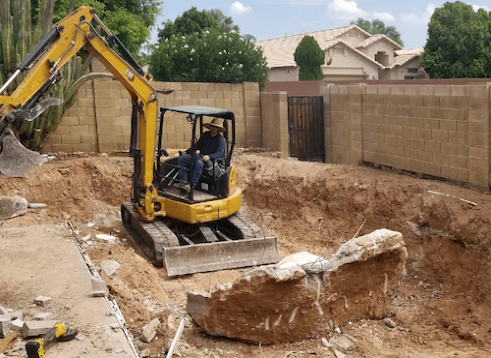
Pool Demolition
When removing a pool in Sacramento, California with the professional demolition team of Maxton Demo, you’re guaranteed peace of mind from beginning to end. From your initial request for an estimate to clean-up, you can expect our pool demolition process that’s completely professional and safe.
Talk to a Demolition Specialist Now! 916.249.5001
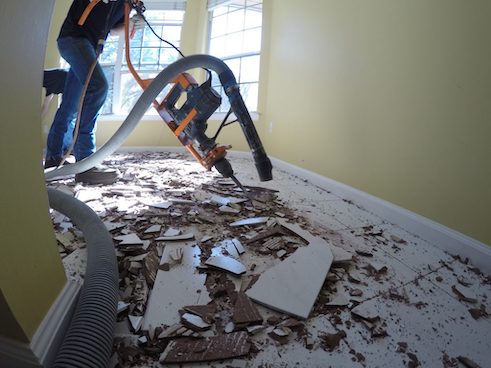
Floor Demolition
Flooring demolition, like any other major home renovation work, requires a specific set of skills and tools to be performed properly. You need experts in flooring demolition to get you the best floors possible. Contact us to find out more about how we can help you today.
Talk to a Demolition Specialist Now! 916.249.5001
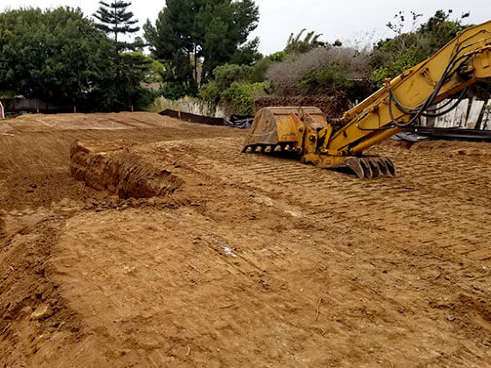
Grading & Excavating
If you need an experienced excavator and grader in Sacramento, call us today. One of the many reasons that residential, commercial, and industrial customers choose to work with us is because we’re able to provide a broad range of services to help construction-related projects get done in less time and at a reduced cost.
Talk to a Demolition Specialist Now! 916.249.5001

Roof Snow Removal
Heavy snow & ice dams can cause significant roof and home damage. Roof Snow removal is our specialty during the winter months. Serving the Sacramento, California area for 10 years, we can get your roof snow removed and promise a quick response and reasonable rates.
Talk to a Demolition Specialist Now! 916.249.5001
Reasons for Residential Demolition
There are several rationales for the potential need for home destruction. The removal of outdated or unrepairable buildings is one frequent justification. These buildings may not be safe to occupy or provide other safety risks. Such properties may be demolished to provide room for new development or renovations, as well as to start again.
Demolition of residential buildings might also take place to create room for new construction or infrastructure initiatives. Cities may need more housing, business space, or public amenities as they expand and change. In these situations, it could be necessary to destroy old residential buildings to make room for the new ones.
Impact of residential demolition on property value
The location of the property is a major component that determines its value. Prospective purchasers sometimes see neighborhoods with a history of demolitions or those now undertaking demolitions as less attractive. The area’s perception of instability and the perceived worth of nearby houses may both be impacted by the presence of destroyed buildings.
It is crucial to remember that, depending on the particulars, the effect of residential demolition on property value might change. The value of the nearby properties may sometimes increase as a result of the demolition of an old or dangerous building. Demolition may provide room for restorations or new buildings, which will increase the area’s appeal to prospective purchasers.
Areas We Service
Demolition Contractor Sacramento
Demolition Contractor Nevada City
Demolition Contractor Grass Valley
Demolition Contractor Gold Run
Demolition Contractor Emigrant Gap
Demolition Contractor Soda Springs
Demolition Contractor Tahoe City
Demolition Contractor Twin Bridges
Demolition Contractor Placerville
Demolition Contractor in Roseville
Demolition Contractor in Auburn
Demolition Contractor in Davis
Demolition Contractor in Dixon
Demolition Contractor in Esparto
Demolition Contractor in Folsom
Demolition Contractor in Lincoln
Demolition Contractor in Plymouth
Demolition Contractor in Rocklin
Demolition Contractor in Shingle Springs
Demolition Contractor in Vacaville
Demolition Contractor in Fairfield
Demolition Contractor in Yountville
Demolition Contractor in Antioch
Demolition Contractor in Concord
Demolition Contractor in Walnut Creek
Demolition Contractor in Lafayette
Demolition Contractor in San Ramon
Factors that affect the impact of residential demolition on property value
The effect of residential demolition on property value is dependent on a number of variables. An essential consideration is the state of the property that is being destroyed. Eliminating a property that is unsafe or in need of repair might enhance the neighborhood’s general appearance and safety, which may increase property prices.
The duration and scope of the demolition process are additional factors to take into account. Potential purchasers may have a bad impression of an area if many houses are being demolished as part of a massive demolition operation. However, the destruction may not be as bad for property prices if it’s a part of a larger redevelopment project that promises to revitalize the neighborhood.
Case studies showcasing the impact of residential demolition on property value
In order to have a better understanding of how residential demolition affects property value, let us examine a few example studies:
Neighborhood Revitalization
A local government chooses to fund a residential demolition project in an area that is decrepit and has a number of abandoned homes. They demolish the existing buildings and provide incentives for brand-new buildings or remodeling. Consequently, the area experiences a revival that draws in new companies and inhabitants. The neighborhood is an attractive location to reside because of the considerable increases in property prices.
Historical Preservation
The question of whether to destroy an ancient home that is historically significant but in bad condition is up for discussion in a historic district. The city makes the decision to save the home and finance its renovation. This choice preserves the neighborhood’s identity while also increasing the value of nearby houses since the historical element provides charm and individuality.
Steps to mitigate the negative impact of residential demolition on property value
You may take the following actions to lessen the possible detrimental effect on your property value if you own a property in an area where residential demolition is either occurring or is planned: Remain informed: Stay up to speed on the initiatives involving demolition and the rationale behind them.
Understanding the context can help you make informed decisions about your property.
Think about renovations. If your property is in need of repair, making an investment in these projects can not only raise its worth but also enhance the area as a whole.
Make connections with neighborhood groups. Participate in neighborhood development initiatives run by neighborhood community organizations. You may influence the planning and decision-making processes by actively engaging.
Alternatives to residential demolition
The demolition of residential buildings is not always the sole choice. There are situations when other approaches could be more suitable. These substitutes may consist of:
Renovation: Repurposing and restoring a building might be a more sustainable alternative than demolishing it. This strategy may solve functional and safety issues while maintaining the neighborhood’s current identity.
Adaptive reuse: A residential property may be converted for business or communal usage as an alternative to being demolished. This strategy has the potential to revitalize dilapidated buildings and enhance the area as a whole.
Hiring a professional demolition company
Hiring a reputable demolition firm is crucial if residential demolition is the best course of action for your home. Demolition is a difficult operation that calls for certain tools and training. Professional demolition workers have the know-how to complete the demolition quickly and safely, reducing any possible dangers and guaranteeing adherence to local laws.
Residential demolition regulations and permits
It is essential to comprehend the laws and licenses needed in your location before starting any house demolition job. There could be certain guidelines and protocols that must be adhered to in each jurisdiction. There may be fines or other legal repercussions for breaking these rules. To negotiate the permission procedure, it is best to speak with local officials or employ an expert.
The Role of Inspections in Preparing for Residential Demolition
Inspections are an essential part of getting ready for house demolition since they guarantee a successful and efficient procedure. These comprehensive evaluations provide insightful information on the state of the property, enabling contractors and homeowners to recognize any hazards, make appropriate plans, and avoid unpleasant surprises. This post will discuss the value of inspections and how they may help with decision-making when it comes to tearing down residential buildings.
The Importance of Inspections in Residential Demolition
Inspections are necessary to determine the general state of the property before starting a residential demolition project. These inspections provide a thorough knowledge of the structure’s integrity, possible risks, and required safeguards, which forms the basis for decision-making. Homeowners and contractors may guarantee the safe and effective execution of the demolition process by investing in comprehensive inspections.
Types of Inspections Required Before Demolition
A number of inspections are required in advance of a home demolition in order to ensure project success. In most cases, structural and environmental examinations are included in the primary inspections. Every one of these inspections has a distinct function and reveals particulars that are necessary for the organization and carrying out of the destruction.
Preparing for a Structural Inspection
One of the most important steps in getting ready for a house demolition is a structural evaluation. The primary objective of this examination is to evaluate the building’s general structural integrity and find any flaws or vulnerabilities that could compromise the demolition procedure. The foundation, walls, roof, and other structural components will all be carefully inspected by a licensed structural engineer or inspector to ascertain their stability and guarantee that the demolition can be completed safely.
An inspector specializing in structural inspections will search for indications of degradation, such as damaged load-bearing walls, sinking floors, or fractures in the foundation. Additionally, they will evaluate how well the facility complies with regional building norms and standards. This assessment yields important information that helps determine the right demolition techniques and safety measures needed to safeguard employees and nearby properties.
Understanding environmental inspections
Environmental inspections are as important as structural inspections when getting ready to demolish a house. The primary goal of these inspections is to find and evaluate any potentially dangerous materials—like asbestos, lead-based paint, or mold—that may be present in the structure. To protect worker safety and environmental requirements, it is crucial to identify these materials prior to the start of the demolition process.
In order to ascertain the existence and concentration of hazardous compounds, a certified inspector will collect samples for laboratory examination during an environmental assessment. In order to safeguard the environment and the workforce, appropriate remediation and disposal protocols must be followed if hazardous items are discovered. Homeowners and contractors may guarantee a safe and compliant demolition process by doing environmental inspections and taking proactive measures to resolve any environmental problems.
Hiring a professional inspection team
Hiring a qualified inspection team with experience in residential demolition is essential to ensuring accurate and comprehensive examinations. These experts possess the skills and information necessary to carry out thorough evaluations and provide thorough reports that support planning and decision-making.
Seek out experts with home demolition expertise, certification, and licensing when selecting an inspection team. They should be very knowledgeable about the construction laws and regulations in the area and skilled at spotting and evaluating any risks. Homeowners and contractors may make well-informed choices and create a well-executed demolition plan by collaborating with a professional inspection team, which gives them confidence in the accuracy and dependability of the inspection reports.
Common Issues Found During Inspections
Inspections often reveal a number of problems that might interfere with the home demolition procedure. These problems might be anything from environmental dangers to site-specific difficulties to structural flaws. Knowing these typical problems ahead of time can help contractors and homeowners prepare ahead of time and ensure a successful demolition.
One common issue found during inspections is the presence of asbestos.
Before the health dangers associated with asbestos were recognized, it was often utilized in building materials. In order to protect workers and stop dangerous fibers from being released into the air, certain abatement processes must be performed if asbestos is found. The detection of lead-based paint, which requires particular removal and disposal processes, is another frequent problem.
Aside from foundation degradation and structural instability, other problems that might come up in an examination include the existence of mold. Inspections may also reveal problems with neighboring utilities, restricted access, or site-specific issues that call for extra preparation and safety measures. Homeowners and contractors may prevent delays and unforeseen expenses throughout the demolition process by taking care of these concerns as soon as possible.
Addressing issues found during inspections
When problems are found during inspections, they must be resolved quickly and skillfully. Several approaches can be needed, depending on the problems’ complexity and severity. For instance, a structural engineer would need to be engaged in order to create a plan for strengthening or repair if the examination finds structural flaws.
To remove and dispose of hazardous items properly, such as asbestos or lead-based paint, you need to contact experts with the necessary skills. Maintaining the environment and workers’ health and safety depends on adhering to all relevant laws and regulations.
It might be necessary to make extra plans and work with local government agencies or utility providers to address site-specific issues. This might include moving utilities temporarily, getting permission to close certain roads, or putting safety precautions in place to safeguard nearby houses.
Through timely and efficient resolution of concerns discovered during inspections, contractors and homeowners may guarantee a safe and orderly demolition operation. Solving problems proactively reduces the possibility of unforeseen delays, overspending, or safety risks.
The Role of Inspections in Ensuring Safety During Demolition
Ensuring the safety of employees, surrounding properties, and the environment is one of the main goals of inspections in residential demolition. Inspections provide important details on the state of the structure, its risks, and the required safety measures. Homeowners and contractors may reduce the likelihood of accidents or injuries by creating a safe working environment and adhering to the suggestions and rules found during inspections.
Inspections are useful in identifying possible safety risks, including shaky foundations, unstable construction, or dangerous items. Before demolition starts, these problems may be resolved, allowing for the implementation of suitable safety and risk-reduction measures. This might include using specialist tools, adhering to safe demolition methods, or giving employees personal protective equipment (PPE).
Additionally, the safety of nearby properties and the surrounding area are also taken into account during inspections. Both homeowners and contractors may avoid damaging neighboring buildings, utilities, or natural resources by recognizing possible dangers and taking the appropriate safety measures.
The impact of inspections on project timelines and budgets
Inspections are crucial to the success and safety of residential demolition projects, but they can have a big impact on project finances and schedules. Extensive inspections provide useful data that aids in creating a precise project plan, calculating expenses, and detecting any hazards.
Homeowners and contractors may find any problems that would take more time or money to fix by doing early inspections. This reduces the possibility of unforeseen delays or cost overruns throughout the demolition process by enabling appropriate planning and scheduling.
Inspections can assist in choosing the right demolition techniques and equipment, which may have an effect on project costs. For instance, extra expenses could be paid for appropriate abatement and disposal if the inspection finds the existence of hazardous chemicals.
In order to minimize the danger of expensive surprises, homeowners and contractors should make sure that the project remains on time and under budget by investing in inspections and resolving any flaws found.
Conclusion: prioritizing safety in residential demolitions in seismic zones
When demolishing residential buildings in seismic zones, great attention to safety must be paid to both design and implementation. Property owners may guarantee that the demolition process is carried out effectively and safely, reducing risks and guaranteeing the well-being of all concerned parties, by emphasizing safety measures and following industry best practices.
Comprehending the distinct obstacles presented by seismic zones is vital for the success of a demolition undertaking. This entails carrying out evaluations before demolition, putting in place the proper safety measures, and using cutting-edge tools and methods. Property owners may handle the challenges of demolition in these high-risk locations with confidence if they choose demolition firms with experience in seismic zone projects.
It is never appropriate to demolish residential buildings in earthquake zones. The community’s safety, that of adjacent buildings, and the safety of employees must always come first. Property owners may guarantee a secure and effective demolition procedure in seismic zones by collaborating with knowledgeable specialists and adhering to the necessary safety precautions.
To sum up, inspections are an essential part of getting ready for home demolition since they provide vital information that helps with decision-making and guarantees a well-run, safe operation. Homeowners and contractors may anticipate possible problems, prepare appropriately, and reduce the likelihood of unforeseen delays or safety issues by undertaking structural and environmental evaluations.
Extensive examinations aid in determining the building’s structural soundness, locating potentially dangerous elements, and analyzing general safety circumstances. This knowledge is essential for choosing the right demolition techniques and taking the required safety measures to safeguard the environment and personnel.
Additionally, inspections reveal possible problems like site-specific obstacles or restricted access that might interfere with the demolition operation. Homeowners and contractors may create a thorough strategy that covers every facet of the job and guarantees a successful and effective demolition by proactively addressing these difficulties.
In the end, rigorous inspections pay off by reducing hazards, fostering a safe work environment, and guaranteeing that the home demolition project is finished on schedule and within budget. Homeowners and contractors may start the demolition process with confidence if they prioritize inspections. This is because they will have the knowledge needed to make wise choices and accomplish their goals.
Both positive and negative effects on property value might result from residential demolition. It is essential for property owners and prospective purchasers to comprehend the several aspects that are involved, including the state of the property, the extent of the demolition project, and the general setting of the area. You may lessen the negative effects of residential demolition and increase the value of your house by keeping an educated mind and exploring your options.